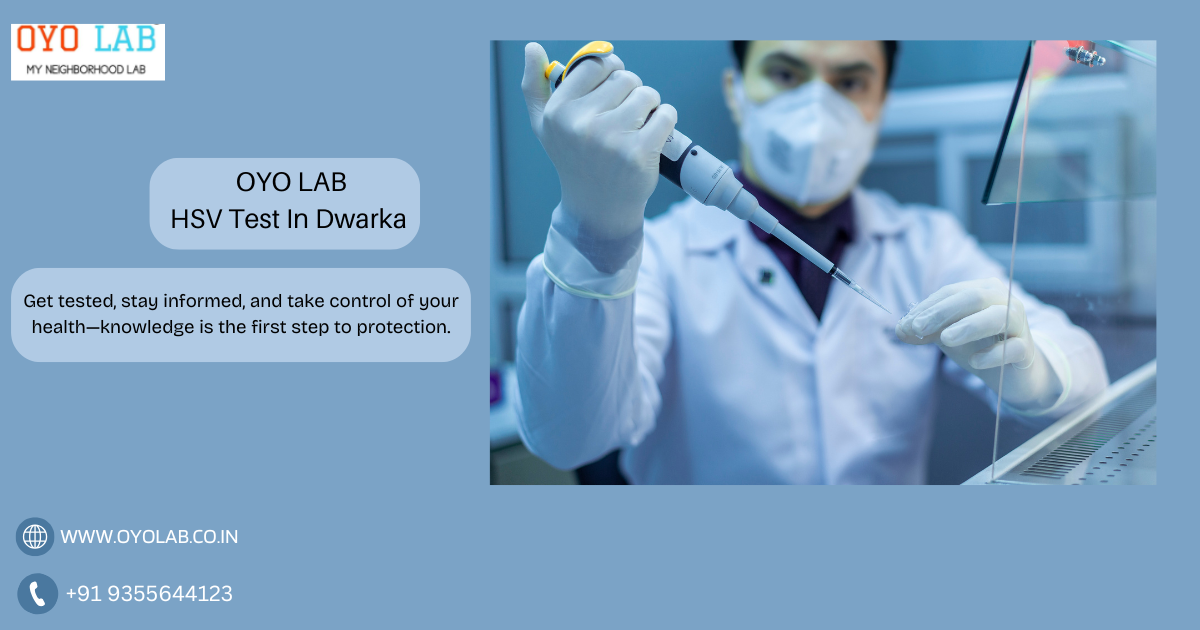
HSV Test In Dwarka
By Shilpa | March 30, 2025
What Is HSV Test ?
The HSV Test is a diagnostic test used to detect the herpes simplex virus (HSV), which causes oral and genital herpes. There are two main types of HSV:
-
HSV-1: Primarily causes oral herpes (cold sores).
-
HSV-2: Primarily causes genital herpes.
Types of HSV Tests
-
PCR (Polymerase Chain Reaction) Test
-
Detects viral DNA from a sample (blood, sore swab, spinal fluid).
-
Highly accurate and commonly used.
-
-
Viral Culture
-
A sample from a sore is tested to see if the virus grows in a lab.
-
Best for active lesions but less reliable for older sores.
-
-
Antibody Blood Test
-
Detects HSV antibodies (immune response to the virus).
-
Shows past or current infection but doesn’t confirm if it’s active.
-
Why Is It Done?
-
Diagnosing herpes when symptoms are present.
-
Confirming a suspected HSV infection.
-
Testing asymptomatic individuals (e.g., before pregnancy or for peace of mind).
Impoortance Of HSV Test
The HSV (Herpes Simplex Virus) Test is important for diagnosing and managing herpes infections caused by HSV-1 (oral herpes) and HSV-2 (genital herpes). Here’s why the test matters:
1. Accurate Diagnosis
-
Helps confirm if symptoms (such as sores, blisters, or ulcers) are caused by HSV.
-
Differentiates between HSV-1 and HSV-2, which is crucial for treatment and risk assessment.
2. Preventing Transmission
-
Early detection allows people to take precautions to prevent spreading the virus to others.
-
Helps pregnant women take measures to protect the baby from neonatal herpes.
3. Managing Symptoms & Treatment
-
Identifies asymptomatic carriers who may unknowingly spread the virus.
-
Guides doctors in prescribing antiviral medications like acyclovir, valacyclovir, or famciclovir to reduce outbreaks and transmission risk.
4. Reducing Complications
-
Untreated HSV can lead to complications like eye infections (herpes keratitis), encephalitis, or severe outbreaks in immunocompromised individuals.
-
In newborns, neonatal herpes can be life-threatening, making early detection in pregnant mothers crucial.
Benefits Of HSV Test
Getting tested for HSV provides several health, safety, and peace-of-mind benefits. Here’s why it’s important:
1. Reduces Anxiety & Provides Clarity
-
Helps those with suspected symptoms confirm or rule out an HSV infection, reducing uncertainty and stress.
-
Allows partners to make informed decisions about intimacy and protection methods.
2. Supports Safer Pregnancy & Childbirth
-
Pregnant women with HSV can take preventive measures to avoid neonatal herpes, which can be dangerous for newborns.
-
Doctors may recommend antiviral treatment or a C-section if necessary to prevent transmission.
3. Helps Public Health Monitoring
-
Widespread testing helps track HSV prevalence and informs public health strategies for managing sexually transmitted infections (STIs).
4. Better Symptom & Outbreak Management
-
If diagnosed early, antiviral medications (acyclovir, valacyclovir, famciclovir) can help reduce symptoms and frequency of outbreaks.
-
Helps individuals with frequent outbreaks find appropriate treatment and lifestyle adjustments to manage triggers.